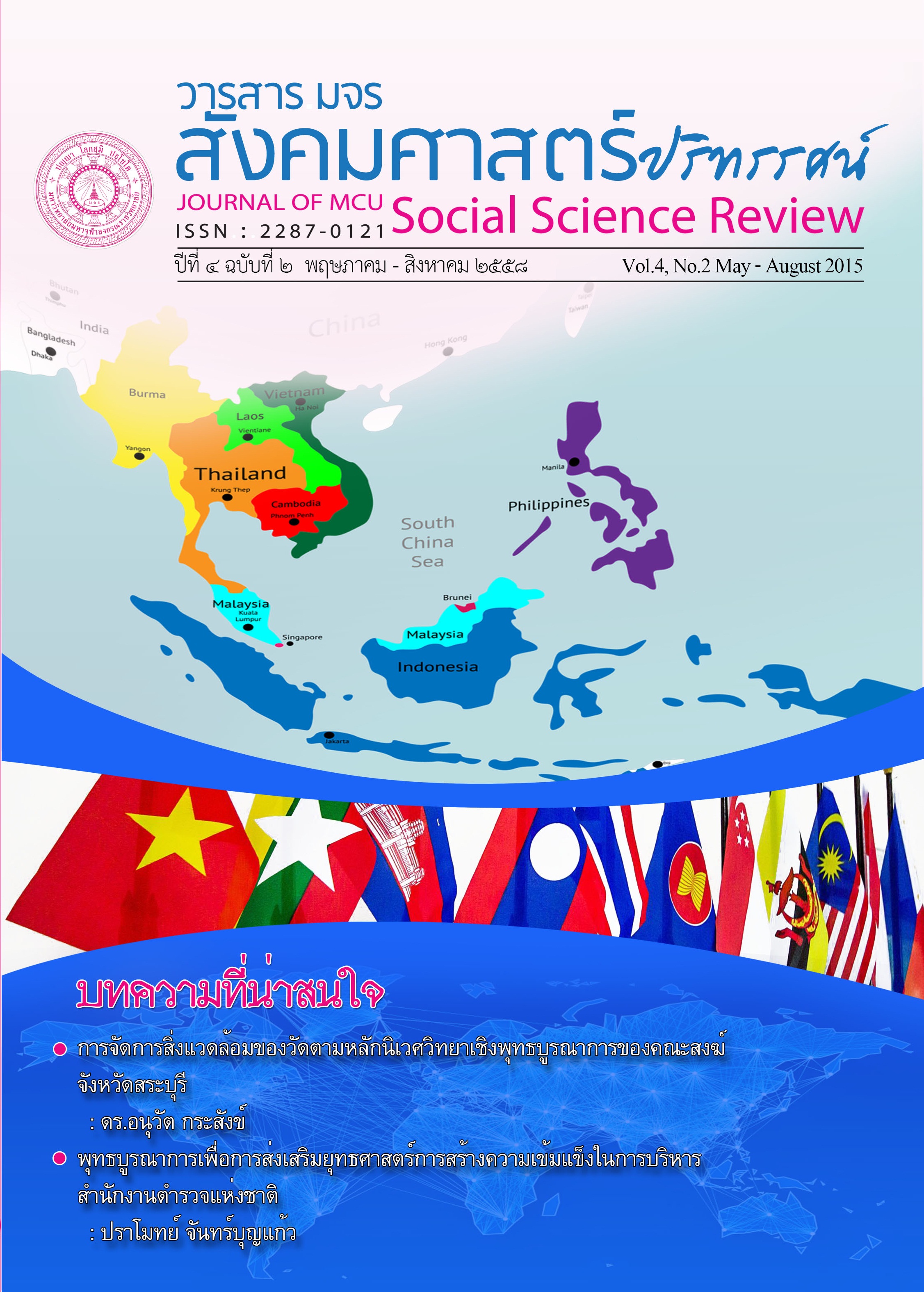รูปแบบการส่งเสริมการจ้างงานนอกระบบตามหลักพุทธธรรม
คำสำคัญ:
การจ้างงาน, แรงงานนอกระบบ, หลักพุทธธรรมบทคัดย่อ
การวิจัยเรื่อง “รูปแบบการส่งเสริมการจ้างงานนอกระบบตามหลักพุทธธรรม” มี วัตถุประสงค์ คือ (๑) เพื่อศึกษาลักษณะการส่งเสริมการจ้างงานนอกระบบตามทฤษฎีการจ้างงาน และหลักพุทธธรรม (๒) เพื่อศึกษาสภาพปัญหาและอุปสรรคของการส่งเสริมการจ้างงานนอกระบบ (๓) เพื่อเสนอรูปแบบการส่งเสริมการจ้างงานนอกระบบตามหลักพุทธธรรม วิธีการวิจัยเป็นการวิจัย แบบผสานวิธี (Mixed-Method Research) คือ การวิจัยเชิงคุณภาพเป็นหลัก และสนับสนุนด้วย การวิจัยเชิงปริมาณ การวิจัยเชิงคุณภาพ (Qualitative Research) เก็บข้อมูลโดยการรวบรวม ข้อมูลทางเอกสาร การสังเกตการณ์แบบไม่มีส่วนร่วมโดยผู้วิจัย การสัมภาษณ์เชิงลึก และการ สนทนากลุ่มผู้ให้ข้อมูลหลักรวมทั้งหมด ๓๔ คน ได้แก่ตัวแทนแรงงานนอกระบบในเขต กรุงเทพมหานครจํานวน ๒๐ คน จากตัวแทนนายจ้าง ๘ คน ตัวแทนภาครัฐ ๔ คน ตัวแทนทางด้าน พระพุทธศาสนา ๒ รูปได้มาโดยการเลือกแบบเจาะจง การวิจัยเชิงปริมาณจากแรงงานนอกระบบใน พื้นที่กรุงเทพมหานคร เกณฑ์ที่ผู้วิจัยเลือกแบบเจาะจง คือ พื้นที่เขตอาศัยกิ่งเมือง และพื้นที่เมืองที่มี ผู้ใช้แรงงานนอกระบบจํานวนมากที่สังเกตเห็นได้อย่างชัดเจน คือ เขตคลองเตย และ เขตคลองสาม วา แรงงานนอกระบบในเขตกรุงเทพมหานครมีจํานวน ๑.๒๙ ล้านคน วิธีการกําหนดขนาดของกลุ่ม ตัวอย่างโดยสูตรของ ทาโร ยามาเน่ (Taro Yamane) ได้กลุ่มตัวอย่างจํานวน ๔๐๐ คนเก็บข้อมูล ด้วยแบบสอบถามที่มีความเชื่อมั่น 0.๕๖ วิเคราะห์ข้อมูลด้วยสถิติ ค่าร้อยละ ค่าเฉลี่ย และค่าส่วน เบี่ยงเบนมาตรฐาน
๑. ลักษณะการส่งเสริมการจ้างงานนอกระบบมีลักษณะการจ้างงานแบบอิสระ ไม่มีการ บันทึกอย่างเป็นทางการ ใช้การเจรจาต่อรองกันด้วยวาจา ไม่มีสัญญาจ้างอย่างเป็นทางการ วิธีการ จ้างงานเป็นแบบรายวัน จึงทําให้ลูกจ้างมีรายได้ที่ไม่แน่นอน หลักพุทธธรรมสําหรับการจ้างงานนอก ระบบประกอบไปด้วย หลักพรหมวิหาร ๔ หลักธรรมในทิศ 5 หลักสังคหวัตถุ ๔ ส่วนหลักธรรม สําหรับลูกจ้างประกอบด้วย หลักอิทธิบาท ๔ และหลักธรรมในทิศ 5 เช่นเดียวกัน
๒. สภาพปัญหาและอุปสรรคประกอบไปด้วย (๑) ปัญหาทั้งนายจ้างและลูกจ้างไม่ได้นํา เกณฑ์วัดมาตรฐานฝีมือแรงงานมาใช้ในการจ้างงาน (๒) นายจ้างกําหนดค่าจ้างไม่เป็นไปตามเกณฑ์ มาตรฐานกระทรวงแรงงาน(๓) การบังคับใช้กฎหมายยังไม่มีประสิทธิภาพในการคุ้มครองแรงงาน แรงงานยังทํางานเสี่ยงอันตราย และงานที่ทําไม่มั่นคง อีกทั้งรายได้ที่ไม่มั่นคงต่อการยังชีพ (๔) ขาด ความร่วมมือระหว่างองค์กรภาคส่วนต่างๆ ที่เกี่ยวข้อง (๕) การมีแรงงานต่างด้าวที่ผิดกฎหมายเข้า มาแย่งชิงตลาดแรงงานนอกระบบด้วยค่าจ้างแรงงานที่ถูกกว่าแรงงานนอกระบบที่เป็นคนไทย
๓. รูปแบบการส่งเสริมการจ้างงานนอกระบบตามหลักพุทธธรรมควรเป็นรูปแบบการ ส่งเสริมแบบพหุภาคี กล่าวคือ เป็นความร่วมมือระหว่างภาคส่วนต่างๆ ประกอบไปด้วย ภาครัฐ ภาคเอกชน ภาคประชาสังคม ภาคนายจ้าง ภาคแรงงาน รวมทั้งองค์กรภาคพระพุทธศาสนา ร่วมมือ กันดําเนินการแก้ไขปัญหา และพัฒนาคุณภาพแรงงานนอกระบบ ให้มีทักษะ มีจิตสํานึกรับผิดชอบ สังคม มีคุณธรรม จริยธรรมในการจ้างงาน เพื่อให้ทุกภาคส่วนมีการส่งเสริมคุณภาพชีวิตการทํางาน รวมทั้งค่าจ้างสวัสดิการ แหล่งที่อยู่อาศัย แก่ลูกจ้างนอกระบบอย่างมีเมตตาธรรม
เอกสารอ้างอิง
(๑) วิทยานิพนธ์/รายงานวิจัยะ ชวพรพรรณ จันทร์ประสิทธิ์,รศ.ดร.และคณะ, “การพัฒนารูปแบบการสร้างเสริมสุขภาพและลดภาวะเสี่ยงจากปัจจัยคุกคามสุขภาพในการทํางานในอุตสาหกรรมเฟอร์นิเจอร์ไม้: การ วิจัยเชิงปฏิบัติการแบบมีส่วนร่วม” รายงานวิจัย. คณะพยาบาลศาสตร์
มหาวิทยาลัยเชียงใหม่: สนับสนุนทุนโดยสํานักงานประกันสังคม, ๒๕๕๖. โชคชัย สุทธาเวศ และคณะ, ตัวแบบทางสายกลางของกลางแรงงานสัมพันธ์ไทย. รายงานการวิจัยสํานักงานปลัดกระทรวงแรงงาน: กระทรวงแรงงาน, ๒๕๕๒.
ธีระ สินเดชารักษณ์และคณะ “ความพร้อมของแรงงานนอกระบบกับการเป็นสังคมผู้สูงอายุในประเทศไทย” รายงานวิจัย. คณะสังคมวิทยาและมานุษยวิทยา:
มหาวิทยาลัยธรรมศาสตร์, ๒๕๕๔.
นิรมล นราทร และคณะ. “แผนยุทธศาสตร์การบริหารจัดการแรงงานนอกระบบ” รายงานวิจัยสํานักงานปลัดกระทรวงแรงงาน, ๒๕๕๐.
สมศักดิ์ อมรสิริพงศ์ “รูปแบบและวิธีการจัดสวัสดิการสังคมที่เหมาะสมสําหรับกลุ่มเด็กและเยาวชนโดยองค์กรปกครองส่วนท้องถิ่น” รายงานวิจัย. กรมพัฒนาสังคมและสวัสดิการ: กระทรวงการพัฒนาสังคมและความมั่นคงของมนุษย์, ๒๕๕๕
(๒) เอกสารที่ไม่ได้ตีพิมพ์เผยแพร่
นอ.นภัทร์ แก้วนาค. หลักการการวิเคราะห์ข้อมูลเชิงคุณภาพ 6่Technic Analysis. เอกสารประกอบการสอน วิทยาลัยการทัพอากาศ , ๒๕๕๕
(๓) สื่ออิเล็กทรอนิกส์/เว็บไซต์:
พานิช จิตร์แจ้ง, ข่าวกระทรวงแรงงาน โครงการสัมมนาเชิงปฏิบัติการรูปแบบ (Model) การบริหารจัดการแรงงานนอกระบบเพื่อขับเคลื่อนแผนยุทธศาสตร์การบริหารจัดการ แรงงานนอกระบบพ.ศ. ๒๕๕๕ - ๒๕๕๔ของกรุงเทพมหานคร (กทม.). [ออนไลน์].แหล่งที่มา: http://www.thaigov.go.th/th/news-ministry/ [๑๕ สิงหาคม ๒๕๕๕] ๒. ภาษาอังกฤษ
(1) Book:
Walter F. Buckley. Sociology and Modern Systems Theory. New Jersey:Englewood Cliffs, 1967.
Peter Checkland. Systems Thinking, Systems Practice. Chichester: John Wiley & Sons, Ltd, 1997
ดาวน์โหลด
เผยแพร่แล้ว
รูปแบบการอ้างอิง
ฉบับ
ประเภทบทความ
สัญญาอนุญาต
ลิขสิทธิ์ (c) 2018 วารสาร มจร สังคมศาสตร์ปริทรรศน์

อนุญาตภายใต้เงื่อนไข Creative Commons Attribution-NonCommercial-NoDerivatives 4.0 International License.
เพื่อให้เป็นไปตามกฎหมายลิขสิทธิ์ ผู้นิพนธ์ทุกท่านต้องลงลายมือชื่อในแบบฟอร์มใบมอบลิขสิทธิ์บทความให้แก่วารสารฯ พร้อมกับบทความต้นฉบับที่ได้แก้ไขครั้งสุดท้าย นอกจากนี้ ผู้นิพนธ์ทุกท่านต้องยืนยันว่าบทความต้นฉบับที่ส่งมาตีพิมพ์นั้น ได้ส่งมาตีพิมพ์เฉพาะในวารสาร มจร สังคมศาสตร์ปริทรรศน์ เพียงแห่งเดียวเท่านั้น หากมีการใช้ภาพหรือตารางหรือเนื้อหาอื่นๆ ของผู้นิพนธ์อื่นที่ปรากฏในสิ่งตีพิมพ์อื่นมาแล้ว ผู้นิพนธ์ต้องขออนุญาตเจ้าของลิขสิทธิ์ก่อน พร้อมทั้งแสดงหนังสือที่ได้รับการยินยอมต่อบรรณาธิการ ก่อนที่บทความจะได้รับการตีพิมพ์ หากไม่เป็นไปตามข้อกำหนดเบื้องต้น ทางวารสารจะถอดบทความของท่านออกโดยไม่มีข้อยกเว้นใดๆ ทั้งสิ้น





